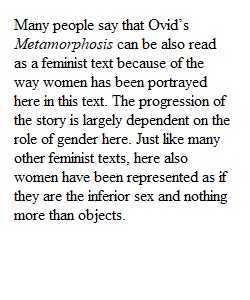


Q Week 3: Metamorphoses No unread replies.No replies. Backgrounds: Ovid is our first known and fully historically documented "single author." Homer is an invention--The Iliad and Odyssey were almost certainly composed 'by committee'--people added to the poems when they were only an oral tradition, the name(s) of the person or more likely persons who wrote Gilgamesh have been lost to history, and if there was a single person named Sun Tzu, scholars are unable to definitely date his lifespan or exact locations. Ovid's life from childhood to exile and death is very well documented by the poet himself as well as Seneca the Elder and Quintillian. Publius Ovidius Naso (43 BC/BCE – 17 AD/CE) Ovid was greatly impactful on Roman Literature and has remained an inspiring writer—especially for Middle Ages writers like Chaucer and Dante and Renaissance writers like Shakespeare. Ranked with Horace and Virgil as one of the three most important writers of imaginative literature in Rome; Ovid was a prolific writer until his exile at the hand of Augustus Caesar (though some scholars argue that this exile was invented by Ovid). Sent to Romania, Ovid is today revered as the first national poet of that country. Many remarked in our discussion of Gilgamesh of the striking similarities between Utnapishtim's story and the more familiar, to most of us, I'd assume, story of Noah in Genesis. In Metamorphoses, we see a creation story not all that different from the creation story in Genesis--a story that it is quite doubtful that Ovid would have known of. The Old Testament, which was not yet translated into Latin (Rome would not adopt Christianity until between 300 and 400 AD/CE, and in Ovid's day, Nazareth and greater Judea was seen as a troubling little outpost on the very frontier of the Empire), would have been as foreign to him as Gilgamesh. That said, Ovid's life and the time of Christ do overlap, so we can get a bit of a glimpse of what life in Rome was like at the time of Christ's presumable childhood from Ovid's writings (less so Metamorphoses than others). We can see similarities and differences between Genesis and Metamorphoses such as: Similarities: order from chaos; chaos darkness before any ‘action’ by the gods/God; light, the stars, the earth, etc. all created the gods/God; humans created from the earth (similar here to creation of Enkidu in Gilgamesh). Differences: In Genesis each day has an order; flood as largely agent of creation in Metamorphoses, not destruction of human world; unknown god of creation in Metamorphoses; more detailed and scientific—globe described as shape of the world in Metamorphoses. Ideas of Metamorphoses How can stories so full of extravagant metamorphoses/change (and violence, rape, sex, lust, divine intervention in horrendous ways) connect to or comment on our world today? Go through some of the changes Ovid depicts in his characters and comment on what you think they might mean. Think and comment also on what the idea of such changes might mean in a more general sense--do we wish to see our 'enemies' punished by the gods in some way or our successes rewarded? Ovid's Women What are the roles of and for women in Ovid's stories? Especially consider the following: Daphne and Io? What do their stories tell us about women, the role of gender in Roman society, the idea of sexuality and courtship (if any)? Look, e.g., at the language of the translation on p. 881 in the Daphne story: "Before her prayer was ended, torpor seized on all her body, and a thin bark closed around her gentle bosom, and her hair became as moving leaves; her arms were changed to waving branches, and her active feet as clinging roots were fastened to the ground— her face was hidden with encircling leaves.— Phoebus admired and loved the graceful tree, (For still, though changed, her slender form remained) and with his right hand lingering on the trunk he felt her bosom throbbing in the bark. He clung to trunk and branch as though to twine. His form with hers, and fondly kissed the wood that shrank from every kiss." It's been in the news lately regarding Harvey Weinstein and others accused of sexual harrassment -- but doesn't Apollo sound very much like what we've seen in these reports, or sad to say, what so many have reported happening to them? More generally, how do Ovid's depictions of women, femininity, and especially masculine attacks on women compare to what we've seen in Gilgamesh through The Iliad? The Gods--from Gilgamesh to Ovid What are your feelings about the gods of the ancient (and we might add in the modern) world? How do the Roman gods as depicted in Ovid compare to the gods in Gilgamesh, the God of the Hebrew Bible, and the Greek gods in The Iliad? Especially consider them in relation to the mortals and desire to control and dominate and punish the mortals? How can we see the ideas about the gods in these texts as perhaps telling us about the lives of the people of the eras?
View Related Questions